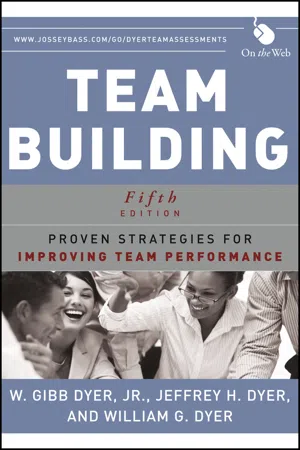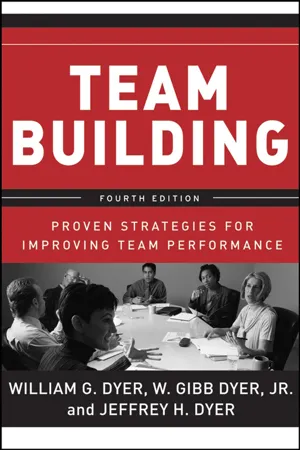Business
Team Challenge
A team challenge in business refers to a collaborative task or project that requires the collective effort of a group of individuals to achieve a common goal. It often involves problem-solving, decision-making, and effective communication among team members. Team challenges are designed to foster teamwork, creativity, and innovation within an organization.
Written by Perlego with AI-assistance
Related key terms
1 of 5
3 Key excerpts on "Team Challenge"
- eBook - ePub
Team Players and Teamwork
New Strategies for Developing Successful Collaboration
- Glenn M. Parker(Author)
- 2011(Publication Date)
- Jossey-Bass(Publisher)
However, the world has changed since I first experienced this company and its emphasis on “living the values.” Today, as Bill George, former CEO of Medtronic, says in his new book (George and Sims, 2007), it is not about “me” (executive) but about “we” (team). The challenge for executives is not to get people to follow them but to empower others (such as team leaders) to lead. The new, more effective style is collaboration and participation rather than command and control. However, although the emphasis now is on a team-based approach, that strategy has led to a culture of rising expectations for teams. The new culture, combined with major changes in the business landscape, has made team success more difficult. As we have said throughout the book, these changes include the following:- The number and variety of cross-functional teams has increased dramatically. An increasing number of teams are global in nature and therefore have a multicultural membership.
- Virtual teams are much more common.
- Teams are more dependent on communications technology, such as email, teleconferencing, video conferencing, and web conferencing.
- Team trust is now both more difficult to achieve and more critical to team success.
- Team meetings are more important and more challenging due to the cross-functional, cross-cultural, and virtual nature of teams.
- Teams require a supportive organizational environment that includes a team-based strategy, structure, systems, and culture.
- Team players serve on multiple cross-functional teams in addition to their functional work team.
- As a result of all of these changes, team leadership is both more difficult and more important.
The Management Challenge
Managers must act in ways that support team players. When task forces, committees, and business teams are formed, managers should look for diversity of team player styles in selecting team members and for a leader with solid technical expertise combined with high-level interpersonal skills. Managers should insist on a support system for teams that includes the following factors: - eBook - ePub
Team Building
Proven Strategies for Improving Team Performance
- W. Gibb Dyer, Jr., Jeffrey H. Dyer, William G. Dyer(Authors)
- 2013(Publication Date)
- Jossey-Bass(Publisher)
9. Periodically review team performance, even if there are no apparent problems. We suggest the regular use (generally once a year) of the surveys found in this book—the team context and composition scale (figure 3.1), the team competencies scale (figure 4.2), the team-building checklist (figure 5.1), and measuring alliance health (figure 14.1). If these instruments indicate problems, then the team can engage in some type of team-building activity to solve the problems and improve performance. We have found that role clarification is a particularly useful exercise as a periodic check to see how team members feel about their roles and what might be done in the team to help each other function more effectively.10. Provide support to help managers and team leaders improve team performance. This means that providing access to internal or external consultants or other resources can help the manager guide the team through the team-building cycle discussed in chapter 5.We believe that if organizations, team consultants, and team leaders take these ten suggestions seriously, we would see improved performance and higher satisfaction for those who work in a team environment.Challenges Facing Organizations of the Future
A number of trends will challenge organizations as they try to make their teams more effective:- The lack of teamwork skills in tomorrow’s workforce
- The increasing need for teams to work together in cross-cultural teams, in virtual workplaces, and across organizational boundaries
- The increasing need for team leaders who can manage team diversity inherent in a global economy
Finding and Developing Employees with Team Skills
One of the challenges facing leaders of organizations is to find employees with the ability to work effectively in a team environment. They typically rely on our educational institutions to provide their prospective recruits with the skills needed to carry out their work. However, in our experience, few educators train students to be effective team players. Moreover, there is increasing evidence that more recent generations—Gen X and Gen Y and millennials—are terrific with technology but are often very self-focused and do not develop the interpersonal skills or patience to work effectively with others in teams. They also typically expect and need lots of praise to stay motivated and are not adept at handling critical feedback. - eBook - ePub
Team Building
Proven Strategies for Improving Team Performance
- William G. Dyer, W. Gibb Dyer, Jr., Jeffrey H. Dyer, W. Gibb Dyer(Authors)
- 2010(Publication Date)
- Jossey-Bass(Publisher)
These challenges include • The lack of teamwork skills in tomorrow’s workforce • The increasing need for teams to work together in virtual workplaces and across organizational boundaries • The increasing need for team leaders who can manage team diversity inherent in a global economy We will briefly discuss each of these in turn. Finding and Developing Employees with Team Skills One of the challenges facing leaders of organizations is to find employees who have the ability to work effectively in a team environment. They typically rely on our educational institutions to provide their prospective recruits with the skills needed to carry out their work. However, in our experience, few educators train students to be effective team players. Our experience in working in academia for several decades is that most education systems undermine the development of team skills in their students. Students are encouraged to work independently and not collaborate with one another. Grades (performance) are explicitly tied to individual performance. This creates an emphasis in self-interest—rather than an orientation to collaborate with others—that can work against the kinds of behaviors needed for successfully teamwork. Jerry Harvey, in a rather controversial chapter titled “Encouraging Future Managers to Cheat,” argues that the emphasis on “doing one’s own work” has a negative impact on the cooperative spirit needed in today’s modern organizations. 1 Harvey argues that “cheating” is often defined as helping someone else with an assignment or doing their work for them. Thus the only “good” student is one who works alone without collaboration or help. Moreover, grades typically are based on individual and not group performance, and thus group-oriented work is not rewarded
Index pages curate the most relevant extracts from our library of academic textbooks. They’ve been created using an in-house natural language model (NLM), each adding context and meaning to key research topics.


